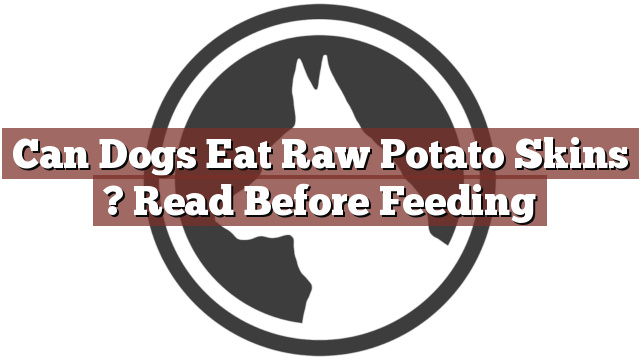Understanding Your Dog’s Dietary Needs
As a responsible pet owner, it’s important to understand your dog’s dietary needs to ensure their overall health and well-being. Dogs are omnivores, which means they can eat a variety of foods including both meat and plants. However, not all human foods are safe for dogs to consume. It’s essential to be aware of what foods are suitable for your furry friend and which ones should be avoided.
Can Dogs Eat Raw Potato Skins? Read Before Feeding
Can dogs eat raw potato skins? This is a common question among dog owners who may be tempted to share their leftover potato skins with their pets. The answer, however, is no. While dogs can eat cooked potatoes in moderation, raw potato skins can be harmful to their health.
Raw potato skins contain solanine, a toxic substance that is also found in other nightshade vegetables such as tomatoes and eggplants. Solanine can cause symptoms such as nausea, vomiting, and even neurological issues in dogs. In severe cases, it can lead to more serious health problems.
Pros and Cons of Feeding Raw Potato Skins to Dogs
Feeding your dog raw potato skins may seem like an easy and convenient way to use up leftovers, but it’s important to weigh the pros and cons before doing so.
One potential benefit of feeding raw potato skins to dogs is that they are a good source of fiber. However, this can easily be obtained through other dog-safe foods, such as vegetables like carrots or green beans.
On the other hand, the cons outweigh the pros when it comes to feeding raw potato skins to dogs. The solanine content in raw potato skins can cause digestive upset and even toxicity in dogs. Furthermore, the high starch content in potatoes can lead to weight gain and other health issues if consumed in excess.
Conclusion: Considerations Before Feeding Your Dog Raw Potato Skins
In conclusion, it is best to avoid feeding raw potato skins to your dog. While it may be tempting to share your food with your furry companion, it’s important to prioritize their health and safety. Instead, provide your dog with a balanced diet that consists of high-quality dog food and appropriate dog-friendly treats. If you have any concerns about your dog’s diet or are considering introducing new foods, it’s always best to consult with your veterinarian for professional advice. Remember, a well-balanced and nutritious diet is crucial for your dog’s overall health and longevity.
Thank you for taking the time to read through our exploration of [page_title]. As every dog lover knows, our furry friends have unique dietary needs and responses, often varying from one canine to another. This is why it's paramount to approach any changes in their diet with caution and knowledge.
Before introducing any new treats or making alterations to your dog's diet based on our insights, it's crucial to consult with a veterinarian about [page_title]. Their expertise ensures that the choices you make are well-suited to your particular pet's health and well-being.
Even seemingly harmless foods can sometimes lead to allergic reactions or digestive issues, which is why monitoring your dog after introducing any new food item is essential.
The content provided here on [page_title] is crafted with care, thorough research, and a genuine love for dogs. Nevertheless, it serves as a general guideline and should not be considered a substitute for professional veterinary advice.
Always prioritize the expert insights of your veterinarian, and remember that the health and happiness of your furry companion come first.
May your journey with your pet continue to be filled with joy, love, and safe culinary adventures. Happy reading, and even happier snacking for your canine friend!

